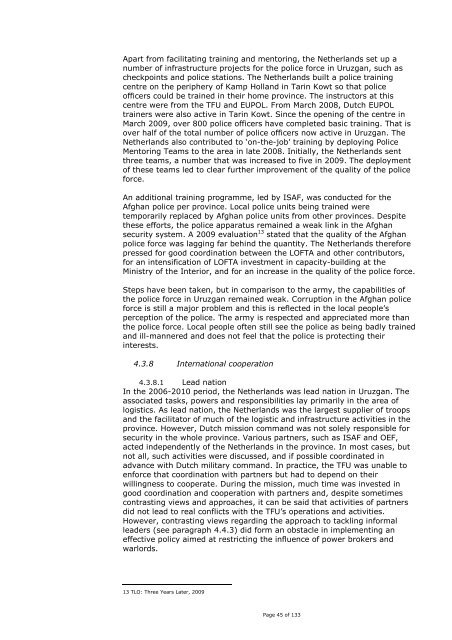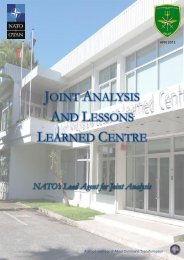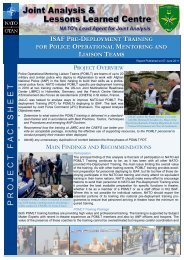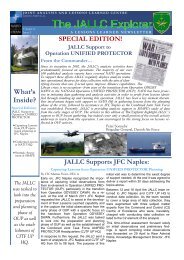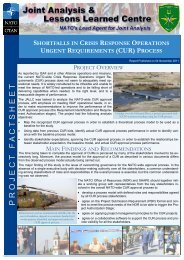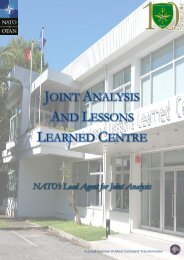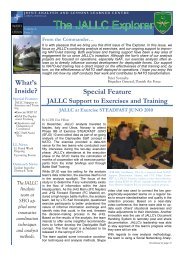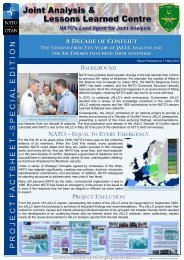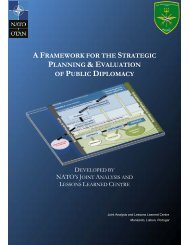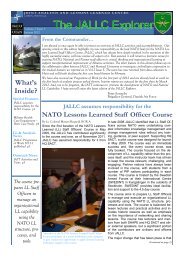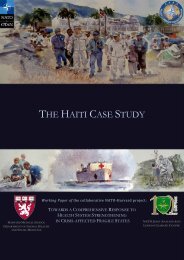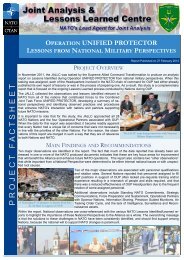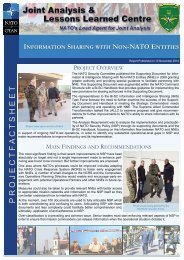ealistic security plan for Uruzgan prov<strong>in</strong>ce and lobbied to implementnational programmes for capacity build-up of security troops <strong>in</strong> Uruzgan.Dur<strong>in</strong>g the mission, the <strong>Netherlands</strong> made a substantial contribution at thenational level of EUR 22.6 million to the ANA Trust Fund, managed byNATO, for strengthen<strong>in</strong>g the Afghan army. The fund<strong>in</strong>g was <strong>in</strong>tended forprocurement of non-lethal materiel.One important national programme for the fund<strong>in</strong>g of the police force wasthe Law and Order Trust Fund Afghanistan (LOTFA). The LOTFA has beenf<strong>in</strong>anc<strong>in</strong>g the build-up of the police apparatus (Afghan National Police[ANP]) s<strong>in</strong>ce 2002. The LOFTA was managed by the UNDP. The core tasksof the fund were the payment of police salaries, capacity development ofthe police force and the M<strong>in</strong>istry of the Interior, improvement of the police’sequipment and <strong>in</strong>frastructure, lend<strong>in</strong>g support to the prison service and<strong>in</strong>creas<strong>in</strong>g the number of women <strong>in</strong> the police force. Police salariesaccounted for approximately 90% of LOFTA’s total budget. The mostimportant contributors to the budget were Japan, the United States, theEuropean Commission, Canada and the <strong>Netherlands</strong>. Dur<strong>in</strong>g the June 2008conference <strong>in</strong> Paris, the <strong>Netherlands</strong> pledged a contribution of EUR 10million for the 2008-2011 period, that it has s<strong>in</strong>ce paid.From 2007, the 4 th Brigade of the 205 th Corps of the Afghan army was alsopresent <strong>in</strong> Uruzgan. Dur<strong>in</strong>g the mission, this Afghan military presence was<strong>in</strong>creased to <strong>in</strong>clude four <strong>in</strong>fantry kandaks 12 and two support kandaks. An<strong>ISAF</strong> Operational Mentor<strong>in</strong>g and Liaison Team (OMLT) was attached to eachunit to advise and mentor the unit <strong>in</strong> the execution of its operational tasks.In Uruzgan, these OMLTs were provided by the <strong>Netherlands</strong>, France, theCzech Republic and Australia. Afghan units were coupled with <strong>ISAF</strong> units asmuch as possible <strong>in</strong> order to better enable them to operate autonomously <strong>in</strong>the future. As much as possible, operations were prepared and executedcollectively. Later on dur<strong>in</strong>g the mission, the Afghan units planned andexecuted their operations <strong>in</strong>dependently on a more regular basis. Examplesof this are the security operations surround<strong>in</strong>g the 2009 presidentialelections and the <strong>2010</strong> parliamentary elections. The Afghan army showed astrong qualitative improvement ow<strong>in</strong>g to the mentor<strong>in</strong>g of the OMLTs andthe partner<strong>in</strong>g with <strong>in</strong>ternational units. Particularly dur<strong>in</strong>g 2009 and <strong>2010</strong>,<strong>in</strong>creas<strong>in</strong>gly larger operations were prepared and executed by the Afghanarmy, with <strong>ISAF</strong> units shift<strong>in</strong>g from a lead<strong>in</strong>g role to an advisory role.Right from the beg<strong>in</strong>n<strong>in</strong>g of the mission, there was also a focus on thebuild-up of a sound police apparatus <strong>in</strong> Uruzgan. After the extension of themission <strong>in</strong> 2007, the <strong>Netherlands</strong>’ focus on the Afghan police <strong>in</strong>tensifiedand, from that moment onwards, policy centred more on the build-up of thepolice force <strong>in</strong> terms of quality. At the start of the mission, the capabilitiesof the police <strong>in</strong> Uruzgan were very limited. From <strong>2006</strong>, PRTs conductedpolice tra<strong>in</strong><strong>in</strong>g courses. Between <strong>2006</strong> and 2008, approximately 1,000Afghans were tra<strong>in</strong>ed for service <strong>in</strong> the Afghan National Auxiliary Police(ANAP), which became part of ANP <strong>in</strong> 2008. The idea of an auxiliary policeforce of low quality turned out to be an unstable concept and the ANAPshowed a large turnover of personnel. What rema<strong>in</strong>ed of the ANAP was<strong>in</strong>corporated <strong>in</strong>to the ANP. The <strong>Netherlands</strong> was an advocate of thedeployment of EUPOL, the European Police Mission, <strong>in</strong> Uruzgan. EUPOLarrived <strong>in</strong> the prov<strong>in</strong>ce <strong>in</strong> 2009 and has s<strong>in</strong>ce contributed to <strong>in</strong>creas<strong>in</strong>g thecapabilities of ANP commanders <strong>in</strong> the area.12 A kandak is an Afghan army unit of battalion size with a strength of approximately 600 men.Page 44 of 133
Apart from facilitat<strong>in</strong>g tra<strong>in</strong><strong>in</strong>g and mentor<strong>in</strong>g, the <strong>Netherlands</strong> set up anumber of <strong>in</strong>frastructure projects for the police force <strong>in</strong> Uruzgan, such ascheckpo<strong>in</strong>ts and police stations. The <strong>Netherlands</strong> built a police tra<strong>in</strong><strong>in</strong>gcentre on the periphery of Kamp Holland <strong>in</strong> Tar<strong>in</strong> Kowt so that policeofficers could be tra<strong>in</strong>ed <strong>in</strong> their home prov<strong>in</strong>ce. The <strong>in</strong>structors at thiscentre were from the TFU and EUPOL. From March 2008, Dutch EUPOLtra<strong>in</strong>ers were also active <strong>in</strong> Tar<strong>in</strong> Kowt. S<strong>in</strong>ce the open<strong>in</strong>g of the centre <strong>in</strong>March 2009, over 800 police officers have completed basic tra<strong>in</strong><strong>in</strong>g. That isover half of the total number of police officers now active <strong>in</strong> Uruzgan. The<strong>Netherlands</strong> also contributed to ‘on-the-job’ tra<strong>in</strong><strong>in</strong>g by deploy<strong>in</strong>g PoliceMentor<strong>in</strong>g Teams to the area <strong>in</strong> late 2008. Initially, the <strong>Netherlands</strong> sentthree teams, a number that was <strong>in</strong>creased to five <strong>in</strong> 2009. The deploymentof these teams led to clear further improvement of the quality of the policeforce.An additional tra<strong>in</strong><strong>in</strong>g programme, led by <strong>ISAF</strong>, was conducted for theAfghan police per prov<strong>in</strong>ce. Local police units be<strong>in</strong>g tra<strong>in</strong>ed weretemporarily replaced by Afghan police units from other prov<strong>in</strong>ces. Despitethese efforts, the police apparatus rema<strong>in</strong>ed a weak l<strong>in</strong>k <strong>in</strong> the Afghansecurity system. A 2009 <strong>evaluation</strong> 13 stated that the quality of the Afghanpolice force was lagg<strong>in</strong>g far beh<strong>in</strong>d the quantity. The <strong>Netherlands</strong> thereforepressed for good coord<strong>in</strong>ation between the LOFTA and other contributors,for an <strong>in</strong>tensification of LOFTA <strong>in</strong>vestment <strong>in</strong> capacity-build<strong>in</strong>g at theM<strong>in</strong>istry of the Interior, and for an <strong>in</strong>crease <strong>in</strong> the quality of the police force.Steps have been taken, but <strong>in</strong> comparison to the army, the capabilities ofthe police force <strong>in</strong> Uruzgan rema<strong>in</strong>ed weak. Corruption <strong>in</strong> the Afghan policeforce is still a major problem and this is reflected <strong>in</strong> the local people’sperception of the police. The army is respected and appreciated more thanthe police force. Local people often still see the police as be<strong>in</strong>g badly tra<strong>in</strong>edand ill-mannered and does not feel that the police is protect<strong>in</strong>g their<strong>in</strong>terests.4.3.8 International cooperation4.3.8.1 Lead nationIn the <strong>2006</strong>-<strong>2010</strong> period, the <strong>Netherlands</strong> was lead nation <strong>in</strong> Uruzgan. Theassociated tasks, powers and responsibilities lay primarily <strong>in</strong> the area oflogistics. As lead nation, the <strong>Netherlands</strong> was the largest supplier of troopsand the facilitator of much of the logistic and <strong>in</strong>frastructure activities <strong>in</strong> theprov<strong>in</strong>ce. However, Dutch mission command was not solely responsible forsecurity <strong>in</strong> the whole prov<strong>in</strong>ce. Various partners, such as <strong>ISAF</strong> and OEF,acted <strong>in</strong>dependently of the <strong>Netherlands</strong> <strong>in</strong> the prov<strong>in</strong>ce. In most cases, butnot all, such activities were discussed, and if possible coord<strong>in</strong>ated <strong>in</strong>advance with Dutch military command. In practice, the TFU was unable toenforce that coord<strong>in</strong>ation with partners but had to depend on theirwill<strong>in</strong>gness to cooperate. Dur<strong>in</strong>g the mission, much time was <strong>in</strong>vested <strong>in</strong>good coord<strong>in</strong>ation and cooperation with partners and, despite sometimescontrast<strong>in</strong>g views and approaches, it can be said that activities of partnersdid not lead to real conflicts with the TFU’s operations and activities.However, contrast<strong>in</strong>g views regard<strong>in</strong>g the approach to tackl<strong>in</strong>g <strong>in</strong>formalleaders (see paragraph 4.4.3) did form an obstacle <strong>in</strong> implement<strong>in</strong>g aneffective policy aimed at restrict<strong>in</strong>g the <strong>in</strong>fluence of power brokers andwarlords.13 TLO: Three Years Later, 2009Page 45 of 133
- Page 1 and 2: Final evaluationNetherlands contrib
- Page 3 and 4: High mountainsLow mountainsPlains a
- Page 5 and 6: Table of ContentsDutch military per
- Page 7 and 8: Dutch military personnel deceased i
- Page 9 and 10: Page 9 of 133
- Page 11 and 12: 1 IntroductionThe government would,
- Page 13 and 14: The structure of the final evaluati
- Page 15 and 16: 2 The international presence in Afg
- Page 17 and 18: insurgents in, particularly, the ea
- Page 19 and 20: 3 Netherlands policy for participat
- Page 21 and 22: Netherlands’ presence. Furthermor
- Page 23 and 24: “The objectives of this stabilisa
- Page 25 and 26: In December 2005, the Netherlands g
- Page 27 and 28: The expectation is that meaningful
- Page 29 and 30: 3.6.2 Implementation of national pr
- Page 31 and 32: 4 Implementation of the mission and
- Page 33 and 34: tasks to fulfil in the area of secu
- Page 35 and 36: such as the Bushmaster, that was be
- Page 37 and 38: Afghan partner unit, at all times o
- Page 39 and 40: northern part of Deh Rawod in 2007.
- Page 41 and 42: in large and small bases, while con
- Page 43: previously thought and comprised a
- Page 47 and 48: If operations in close proximity of
- Page 49 and 50: As previously mentioned, the preven
- Page 51 and 52: - Between 2006 and 2010, the number
- Page 53 and 54: government of Chora in January 2010
- Page 55 and 56: At the beginning of the Dutch missi
- Page 57 and 58: intermediary of TLO and political a
- Page 59 and 60: interest for filling judicial posit
- Page 61 and 62: During the Uruzgan mission, a great
- Page 63 and 64: structurally change governance in U
- Page 65 and 66: development programmes. Before the
- Page 67 and 68: also the way in which Afghans perce
- Page 69 and 70: tailored to the real needs of the p
- Page 71 and 72: Gizab had increased and there was a
- Page 73 and 74: The DCU programme devoted and still
- Page 75 and 76: purpose of these loans, cooperative
- Page 77 and 78: In view of the lack of enthusiasm a
- Page 79 and 80: 5 Expenditure for the mission and i
- Page 81 and 82: Overview of long-term expenditure a
- Page 83 and 84: expenditure related to the deployme
- Page 85 and 86: Multi-year expenditure, Foreign Aff
- Page 87 and 88: explosive ordnance disposal, armour
- Page 89 and 90: this situation as constraining, for
- Page 91 and 92: organised at a later stage. In addi
- Page 93 and 94: occupational social workers and the
- Page 95 and 96:
Mercedes Benz terrain vehicle, the
- Page 97 and 98:
6 ConclusionsThis chapter begins wi
- Page 99 and 100:
The first part of the central quest
- Page 101 and 102:
At the end of 2005, the Afghan auth
- Page 103 and 104:
province. This, too, was done by me
- Page 105 and 106:
area, increased sales of agricultur
- Page 107 and 108:
ISAF and the OEF led to extra coord
- Page 109 and 110:
d. The recommendations from advisor
- Page 111 and 112:
Page 111 of 133
- Page 113 and 114:
Annex A, Afghanistan Compact Benchm
- Page 115 and 116:
end-2010, reforms will strengthen t
- Page 117 and 118:
Afghan Cultural HeritageA comprehen
- Page 119 and 120:
Private Sector Development and Trad
- Page 121 and 122:
Annex B, Results of the socio-econo
- Page 123 and 124:
EducationTLO data:• In 2006 there
- Page 125 and 126:
Overview of the number of children
- Page 127 and 128:
Annex C, Chronology200522 December:
- Page 129 and 130:
July: microcredit provider World Co
- Page 131 and 132:
Annex D, List of abbreviations3DADZ
- Page 133:
Page 133 of 133


